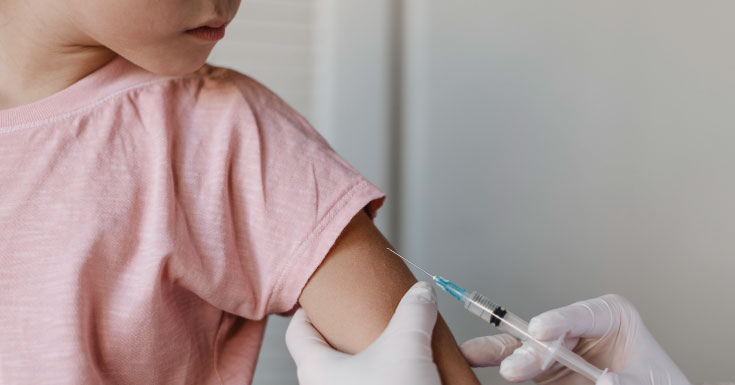Importance of vaccination for children
Diseases still persist today even if our healthcare system and hygiene standards have improved. While improved medical treatment and cleanliness standards decrease the development of diseases, they are insufficient to completely eradicate them. This is because the majority of infections spread through contact. The people who are most vulnerable to these diseases are our children.
When you are a new parent, the topic of childhood vaccinations or immunisations may seem overwhelming. The Child Development Centre (CDC), the American Academy of Pediatrics, and the American Academy of Family Physicians all propose vaccination schedules that cover around 13 different diseases.
Dr Margaret Kannimmel explains that by eradicating or significantly reducing harmful diseases that used to travel from child to child, vaccinations not only keep your child safe from devastating illnesses like polio, tetanus, and diphtheria but also keep other children safe.
A vaccination is a disease-causing bacterium that has been killed, rendered weak, or otherwise altered. When children are exposed to a disease in vaccine form, their immune system, which is the body’s germ-fighting machine, is able to build up antibodies that protect them
Here is why vaccination is important for children:
- Your baby is very vulnerable to infections
- Protection offered through breast milk (maternal immunity) is not enough
- Immunity through natural infection is risky. Children’s bodies cannot always fight off these diseases.
- Your child can still catch a dangerous infection even though your child seems healthy and strong.
- Childhood Immunisation is the most effective way to protect children.
Immunity will wane over time, so remember to get the boosters.
The Malaysian National Immunisation Programmed (NIP)
The National Immunisation Program (NIP) of Malaysia was initiated in the early 1950s. The Expanded Programme on Immunisation (EPI) of the World Health Organization (WHO) served as the model for our Malaysian NIP’s creation (EPI). The EPI urges all nations to immunise children against six illnesses. Our Malaysian National Immunisation Program (NIP), however, has increased protection against 13 important pediatric illnesses.
Diseases that the National Immunisation Programme (NIP) covers today:
- Diphtheria
An infectious disease caused by bacteria that live in the mouth and throat of the infected person. - Haemophilus influenzaetype B (Hib)
A serious infection that mainly affects children under 5 years. - Hepatitis B
Infection of the liver by the Hepatitis B virus. - Human papillomavirus (HPV)
Most common sexually transmitted infection (STI) that causes cervical cancer which is the third most common cancer in women. - Japanese encephalitis (JE)
Infection of the brain caused by JE virus. - Measles
A highly contagious viral disease. - Mumps
A viral infection that is the most common cause of inflammation of the brain (encephalitis). - Pertussis – Whooping Cough
Highly contagious, with violent and persistent coughing that may cause a child to struggle to breathe and, turn blue (cyanosed). - Poliomyelitis (polio)
An infectious and incurable viral disease that attacks the nervous system. - Rubella
Also known as German measles that may cause abnormalities to the fetus. - Tetanus
Also known as lockjaw, caused by bacteria toxins that attacks the body’s nervous system. - Tuberculosis (TB)
A disease that commonly infects the lungs, but can also attack other parts such as the kidney, spine, skin, intestines and brain. - Pneumococcal
A bacterial infection caused by Streptococcus pneumoniae that can affect the lungs and other parts of the body.
Where can our children receive their vaccinations under the National Immunisation Programme (NIP)?
The National Immunisation Programme (NIP) vaccinations are provided free-of-charge at all government clinics across the country. They are also available at private clinics, where you may have to pay a small fee.
When does my child have to get these vaccines?
There is a National Immunisation Programme (NIP) schedule (see below). It is important to follow this schedule closely as doctors and other public health experts have worked hard to come up with the optimal vaccination schedule, affording the most complete and safest protection possible. It is not advisable to skip or delay vaccines, as this will leave the child vulnerable to disease.
Common childhood vaccines and their benefits
Because proof of immunisation is often a prerequisite for enrollment in school or day care, it’s important to keep your children up to date on their vaccines. The benefit of doing so is that your children will be protected from diseases that could cause them serious health problems. The recommended immunisations for children 0-6 years of age include:
- Hepatitis B
- Rotavirus
- Diphtheria, tetanus, pertussis
- Haemophilus influenzae type B
- Pneumococcal
- Poliovirus
- Influenza
- Measles, mumps, rubella
- Varicella (chickenpox)
- Hepatitis A
- Meningococcal (for certain high-risk groups)
- COVID-19
Additional recommended vaccines for children
There are currently 5 other vaccines that prevent diseases that can be deadly to children.
- Chickenpox (varicella)
A highly contagious disease which causes fever and blistering skin. - Hepatitis A
Infection of the liver by the hepatitis A virus. - Influenza
A viral infection of the nose, throat and lungs. - Meningococcal disease
A bacterial infection of the lining of the brain and spinal cord that can lead to permanent disability. - Rotavirus
Causes vomiting and severe diarrhoea in babies.
Numerous of the immunisations described above offer protection against prevalent pediatric illnesses. Additionally, these advised vaccinations have the power to halt the spread of epidemics and disease. They are just as crucial to protecting your kids from diseases that can be prevented by vaccination as regular immunisations. Like the NIP, there is a recommended schedule for the best protection for our little ones. Your doctor will advise you on the appropriate timing of the vaccines.
Immunisation schedule
Risks and concerns surrounding vaccination?
Most people don’t have any serious side effects from vaccines. The most common side effects—like soreness where the shot was given—are usually mild and go away quickly on their own.
What are common side effects of vaccines?
The most common side effects after vaccination are mild. They include:
- Pain, swelling, or redness where the shot was given
- Mild fever
- Chills
- Feeling tired
- Headache
- Muscle and joint aches
Fainting can also happen after any medical procedure, including vaccinations.
Keep in mind that most common side effects are a sign that your body is starting to build immunity (protection) against a disease. Learn more about how vaccines provide immunity.
What about serious side effects?
Serious side effects from vaccines are extremely rare. For example, if 1 million doses of a vaccine are given, 1 to 2 people may have a severe allergic reaction.
Signs of a severe allergic reaction can include:
- Difficulty breathing
- Swelling of your face and throat
- A fast heartbeat
- A bad rash all over your body
- Dizziness and weakness
Call your vaccination provider or your healthcare provider if you have any side effects that bother you or do not go away.
How to make an informed decision about vaccination for your child?
Vaccines protect against diseases
Different types of vaccines work in different ways to offer protection. With all types of vaccines, your body will remember how to fight that virus in the future. It typically takes a few weeks after vaccination for the body to build up that protection.
Strengthening your baby’s immune system
Immunity is the body’s way of preventing disease. Your baby’s immune system is not fully developed at birth which can put your baby at a greater risk for infection. Vaccines reduce your child’s risk of infection by working with the body’s natural defenses to help safely develop protection against disease.
Vaccine ingredients
Today’s vaccines use only the ingredients they need to be as safe and effective as possible. All ingredients of vaccines play necessary roles either in making the vaccine, triggering the body to develop immunity, or in ensuring that the final product is safe and effective.
Some of these include:
- Adjuvants help boost the body’s response to a vaccination. (Also found in antacids, antiperspirants, etc.)
- Stabilizers help keep a vaccine effective after it is manufactured. (Also found in foods such as Jell-O® and resides in the body naturally)
- Formaldehyde is used to prevent contamination by bacteria during the vaccine manufacturing process. It resides in body naturally (more in body than vaccines). (Also found in environment, preservatives, and household products.)
Thimerosal is also used during the manufacturing process but is no longer an ingredient in any vaccine except multi-dose vials of the flu vaccine. Single dose vials of the flu vaccine are available as an alternative. No reputable scientific studies have found an association between thimerosal in vaccines and autism.
Dr. Margaret Kannimmel
Consultant Pediatrician
Columbia Asia Hospital – Setapak





